Photo courtesy of Reena Rose Sibayan | The Jersey Journal.
Today, Jersey City is one the most diverse places in the country. From the Heights to McGinley Square and Greenville, each neighborhood has different communities with different cultures. And while the city’s ethnicities are embraced–and marketed as such–it wasn’t always as accepting.
Jersey City Council President Joyce Watterman grew up in Ward B, which is located on the west side of the city, past Journal Square and close to Route 440, where she often dealt with segregation and other forms of racism. Living in the city for a long time, she has seen an improvement in how communities interact with one another. Back then you would not see communities crossing into different neighborhoods. Now, there are mixes of cultures everywhere you go.
“… You look out here, you see so many different cultures. It’s important for the next generation to learn how to live together… I fight for equality because I believe everyone should have a right to make their choice for their life. I grew up in an era where people were trying to make my choices for my life. And so now I fight to be a voice for everyone, to make a choice for their life.”
Watterman joined the city council in 2011. The council consists of nine members; six represents the city’s six wards while three at-large council members represent the entire city. They mainly handle local legislation, but they also focus on residents’ quality of life like parks or helping people get a certain skill set.
A couple of years later, Watterman was elected to be council president, which is a vote that happens amongst the council members.
“My mother is a first generation sharecropper. So for me to achieve that, and she was alive at the time, was very humbling, but rewarding… I know I’m breaking down barriers for not just African-American, but for people of color,” she said. “… I’m doing it really to make a pathway for others to know that they have a right to be at the table.”
Watterman grew in Ward B’s housing authority, which is often referred to as the projects. She attended Dickinson High School, which was predominantly White at the time. The only time you’d see minorities were teenagers from the Marion Gardens, a housing authority on Dales Avenue, or the Duncan Projects, a housing authority on Duncan Avenue across from Lincoln Park, both of which often got “a bad rap.”
“Growing up in that… people [were] still discriminating against you, people [were] still calling you names. But through all of those challenges, I knew that I deserved a better life,” she said.
She went on to Somerset Christian College and earned a B.A. in organizational leadership and associate’s in biblical studies. She later got her master’s in organizational leadership from Pillar College; both institutions are located in New Jersey.
Bringing Services to the People
Jersey City has seen a rise of popularity over the last decade, but areas like Bergen-Lafayette and Greenville aren’t necessarily places tourists or newcomers flock to; they’re not typically listed in online Jersey City guides either and often overlooked by the city.
During her term, Watterman has brought a number of community events and resource opportunities to the city and has doubled down on her commitment to bringing services to underserved areas in Jersey City as she opened her community office at 153 Martin Luther King Drive about two years ago.
“This space is important to me because there are a lot of places that people won’t go into. And these people around here deserve the services…I bring various services here,” she said.
“I chose this place here because I felt like it would be a place for them to go. It’s in their neighborhood. These are the neighborhoods that need to be serviced… Least they know that they have a council person that they can touch on this side of town. I’m here at least two to three days a week. Sometimes I’m here all week.”
The community center is decorated with a number of tables, chairs and various wall decorations of encouraging words or phrases, including religious sayings. Posters of Jersey City’s wards and old newspapers are hung while, on the other side of the room, handwritten post-it notes dangle with motivation. They have a television, computer, refrigerator and flyers for upcoming community events. In the next room, there’s a couch and more chairs with a backdrop that reads, “Hudson County Black Caucus.”
Every Tuesday at 4 p.m., the caucus office offers a wellness check-in where people can vent or get things off their chest in a “safe” judgement free and confidential environment with a social worker. Every Wednesday, from 10 a.m. to 2 p.m., county social services are also available.
“Often people think nothing good could come out of the projects, but I’m a testament to that,” she added. “Good stuff does come out of neighborhoods where people do not want to go. You just have to give the people a fair chance.”
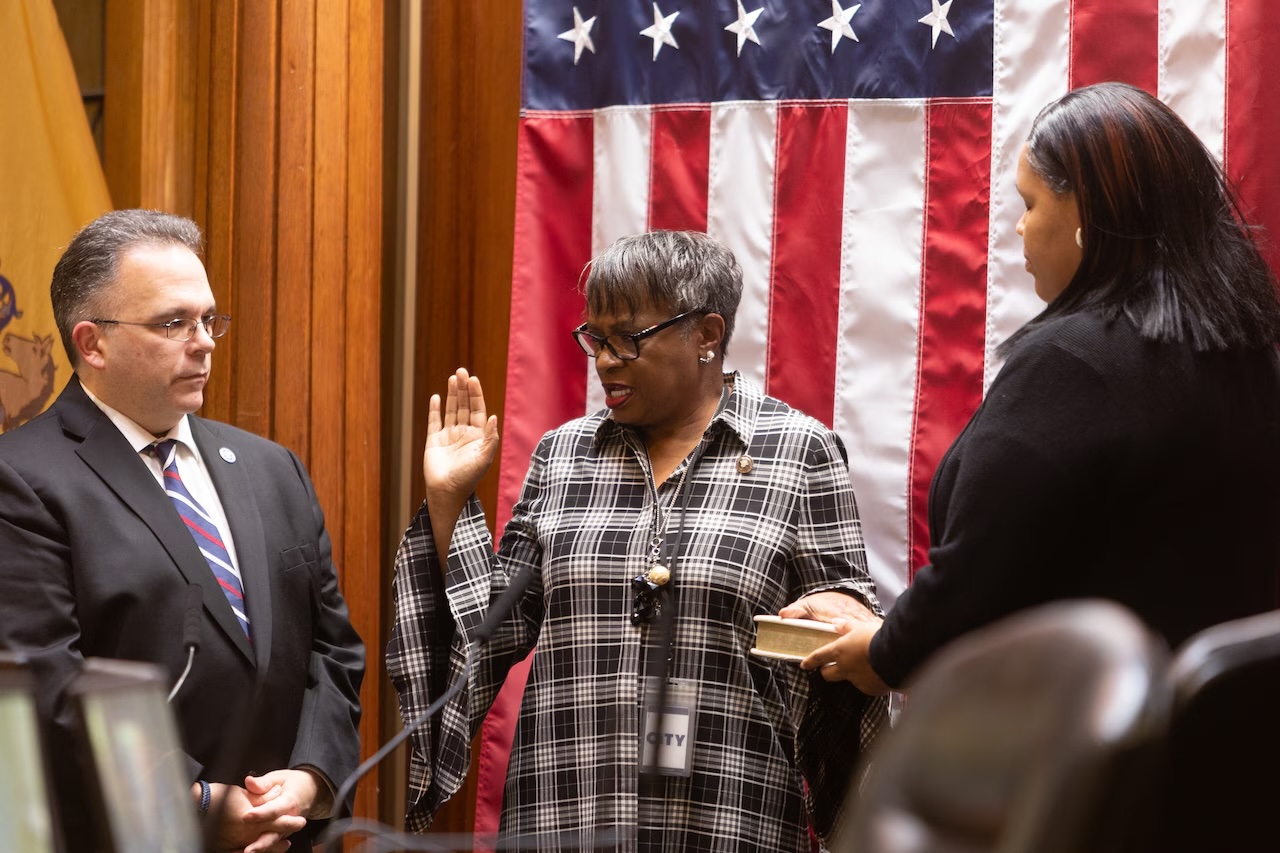
As council president, Watterman handles a number of issues and concerns. Some that she said still needs more attention are: handling employment for formerly incarcerated, “slum” landlords and the effects of gentrification.
She has been a volunteer for over 30 years at Eastern State Prison and roughly eight years at Clinton State Prison. According to the Bureau of Justice Statistics, about 60% of formerly incarcerated people struggle with unemployment.
“You begin to see the struggles that they have once they are out on the street. And so, if we want them to change what we really have to do, we have to put things in place to help them get to the next level,” she said. “Not everybody wants to go back to jail. Let me make it clear. No, they don’t. But when the system keeps beating you down and don’t help you provide for your family, you force a person in the street to do what they need to do to survive. And I know someone would say, well, they shouldn’t steal, well then hire [them]. Give them a chance.”
Watterman credited Senator Sandra Cunningham, D-Jersey City, for sponsoring the “ban the box” legislation. This bill banned employers from making job seekers check a box that states whether they’ve been convicted of crime. Cunningham, who recently retired, stated that the bill will give people who’ve had an issue with the justice system an opportunity for a better job.
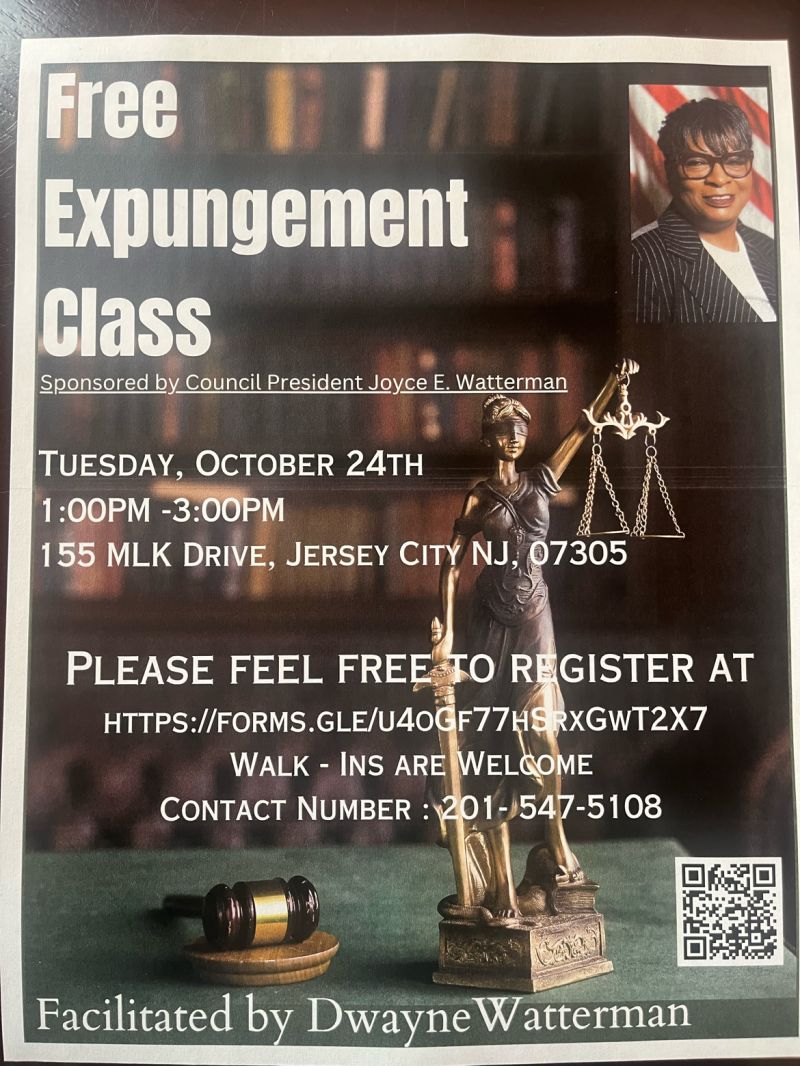
The other issues, which Watterman said correlates with one another in some way, are very common in the city, especially in the recent years. From the massive construction in Journal Square to the questionable future of Bay Front on Route 440, luxury apartments and retail stores continue to appear in different areas.
On MLK Drive, down the block from Watterman’s community office, stands a tall luxury apartment that looks like it had just been fully built.
The council president said the issue is twofold: if a resident deals with a slum landlord, they’ll eventually move out; when they move out, the landlord can sell their building, which will give an opportunity to build another luxury apartment. Jersey City, in general, is viewed as “more accessible” and “more affordable” than moving to New York, according to a local real estate agent, which is why many jump for the opportunity.
Watterman said a way to combat this, which would be considered gentrification, is by teaching people about home ownership through recurring classes like a first-time home buyer class.
“To counteract gentrification you have to teach people home ownership and let them know they have a right to own. So often in the minority areas, they make it seem like home ownership is a burden. I’m trying to change the way people are thinking and tell ’em, no, it’s not a burden, it’s a necessity,” she said.
“Because if they own the property, then they cannot be pushed out. That’s what I’m trying to get them to see.”
What’s Next
Watterman’s term as council president will run until December 2025, a term that coincides with the city’s mayor term.
Jersey City Mayor Steve Fulop already announced his intention of pursuing the seat for New Jersey Governor, leaving the local chair up for grabs. Watterman told Slice of Culture that she intends to run, but is waiting to announce it because the election is not until 2025.
“I just think it’s important that the city of Jersey City, a place that I was born and raised in, that people see that they have options. I want people to know that they have options. So stay tuned for options,” she said.
Once she officially announces her run, she will be joining already-declared candidates Hudson County Commissioner Bill O’Dea; former state governor Jim McGreevy; and former Jersey City Board of Education President Mussab Ali.
When not dealing with official duties, Watterman and her husband offer events like health fairs or sessions like resume writing classes at the Continuous Flow Christian Center, located at 168 Monticello Avenue in the Bergen-Lafayette section of Jersey City. To them, it was important to bring certain services to the communities that “people did not want to go into.”
Whenever she has free time, Watterman might be planning for her next vacation, which she tries to do at least four times a year with friends, family and herself, or listening and dancing to some music like Motown or Michael Jackson classics.
“When you get in office or wherever you choose to be in life with career, be who you are,” she said.
“Don’t allow them to take away who you are as a person, because it was those qualities that made you who you are.”

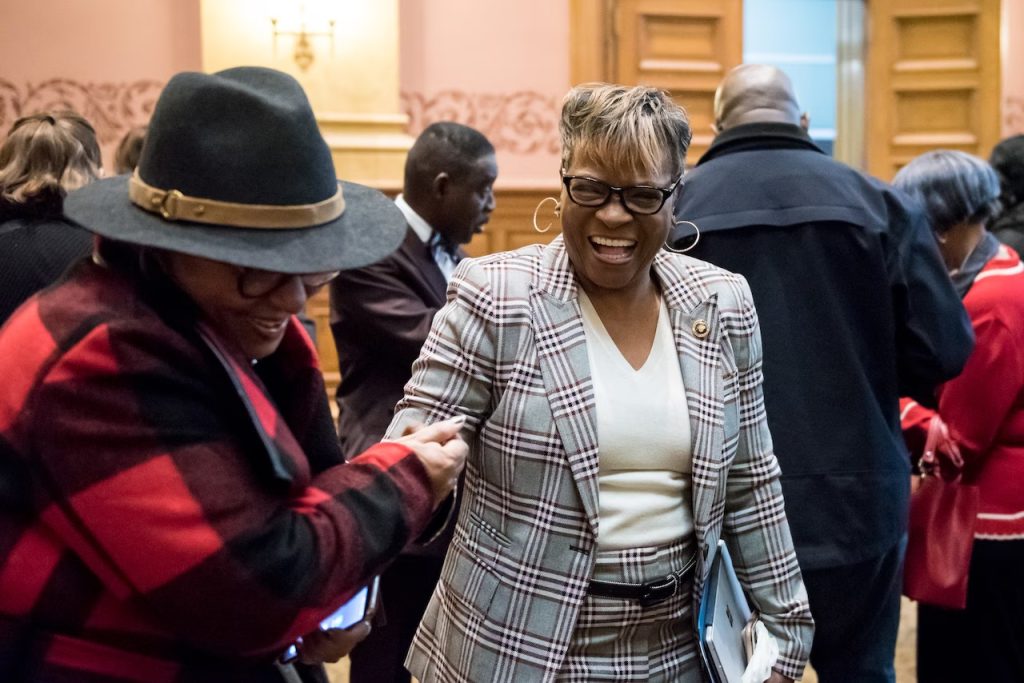

 Get your slice of culture from NJ
Get your slice of culture from NJ Hudson County born & raised
Hudson County born & raised The Locals + The Culture
The Locals + The Culture “Best Grassroots Journalism” @njspj + @njcivicinfo grantee
“Best Grassroots Journalism” @njspj + @njcivicinfo grantee



 We stopped by Excel
We stopped by Excel










 E
E









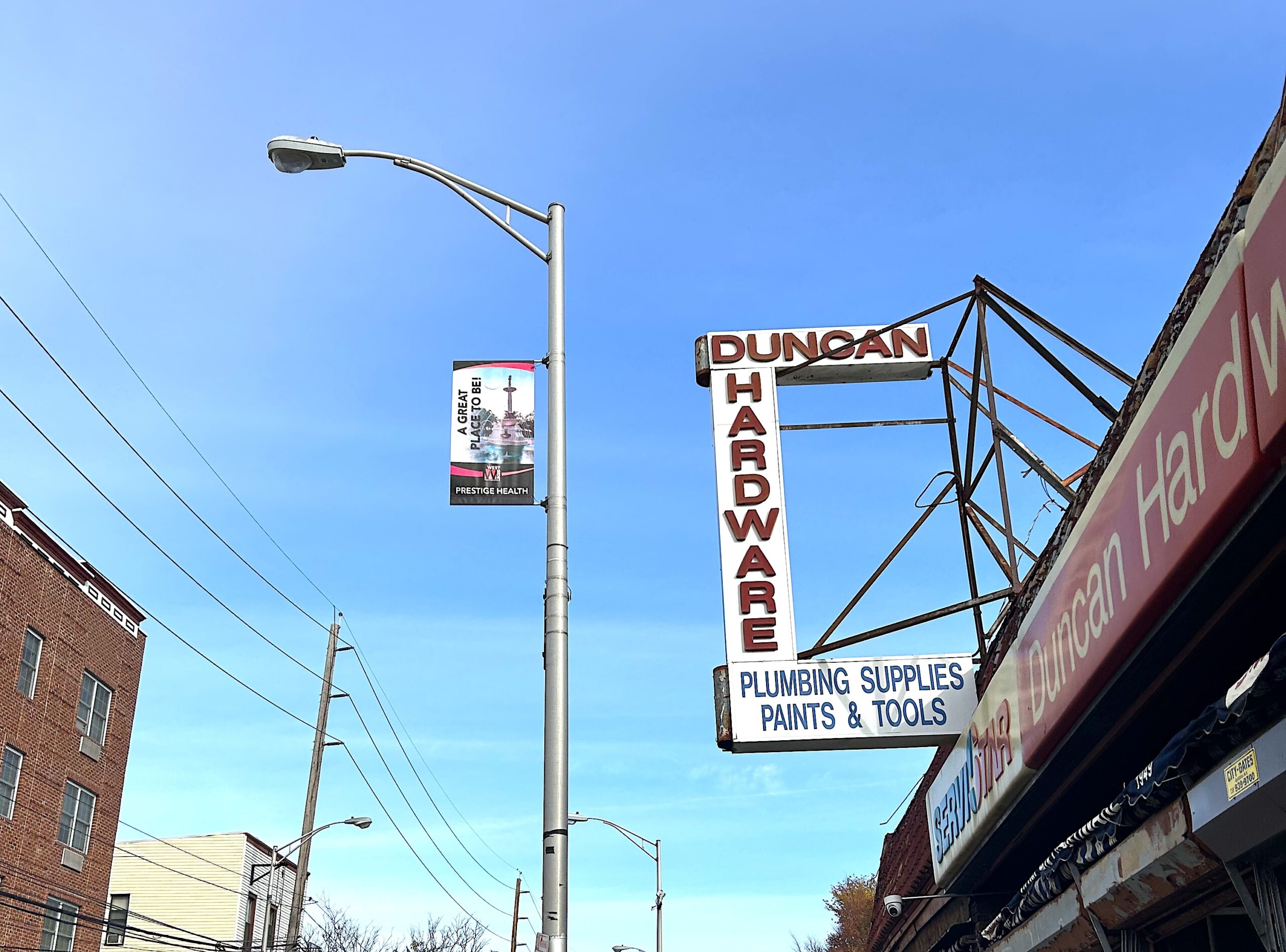
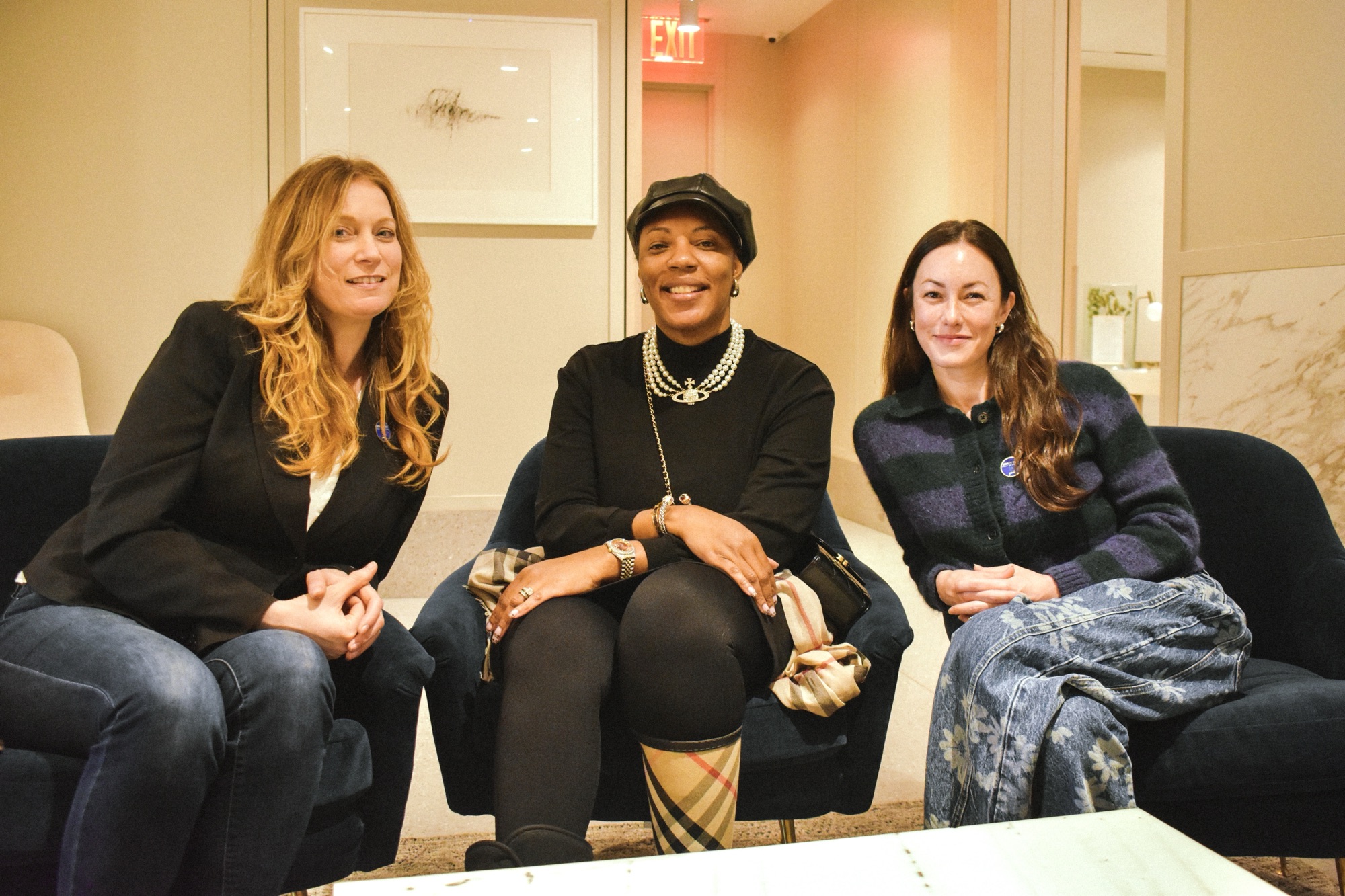


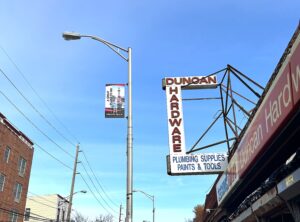



One Response